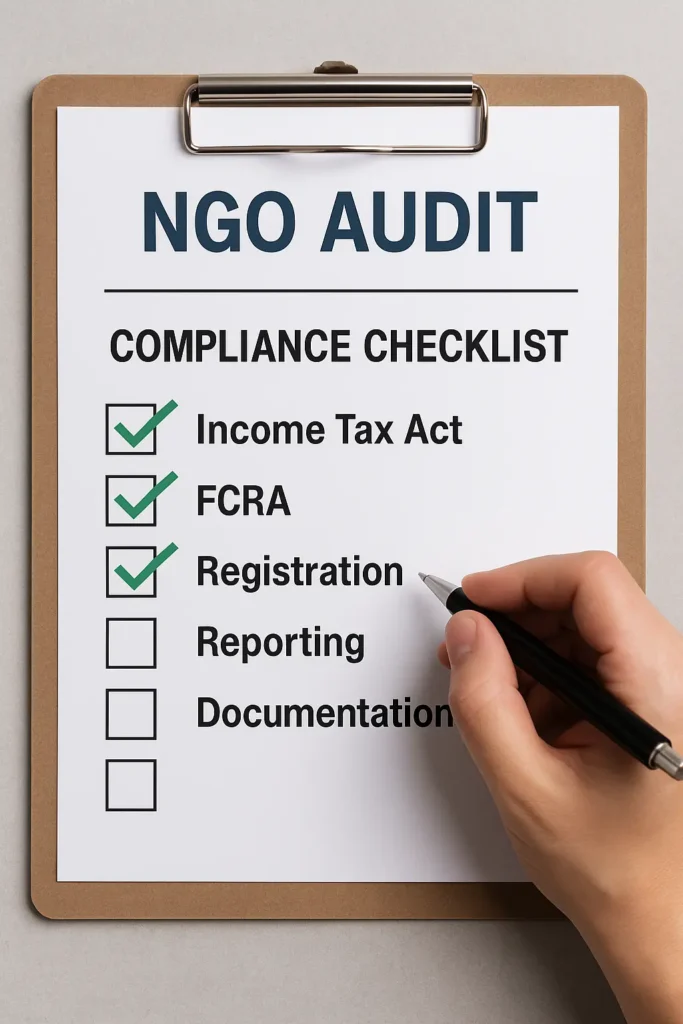Non-Governmental Organizations (NGOs) are fundamental to the social and economic fabric of society, operating with a core mission to serve public welfare rather than generate private profit. These organizations channel donations, grants, and other contributions towards achieving vital social objectives, such as providing education, offering economic assistance, and delivering essential health and medical facilities. Navigating the regulatory and financial landscape is a critical endeavor for Non-Governmental Organizations (NGOs) to sustain their vital social and economic contributions. A robust audit process is not merely a legal obligation but a cornerstone for trust, transparency, and operational excellence. This article provides a comprehensive overview of NGO audits in India, detailing their importance, types, procedural requirements, and the crucial role they play in ensuring accountability.
Understanding the NGO Landscape and the Necessity of Audits
NGOs are distinct entities established not for profit, but to serve society. They operate without individual ownership, reinvesting any surpluses back into their non-profit activities. Their funding typically comes from diverse sources, including donations, grants from various agencies, membership fees, and returns on investments.
In India, NGOs can be registered under several legal frameworks, such as the Indian Trusts Act, the Societies Registration Act, or as a Company under the Companies Act, 2013, including Section 25 companies, or even as a Charitable Trust under the Charitable Endowments Act, 1920.

The essence of an NGO audit is an independent examination of an organization’s activities to verify that they are conducted efficiently and in compliance with established norms. While the process may seem time-consuming, the benefits are substantial:
- Ensuring Transparency and Accountability: Audits provide tangible proof of financial transparency and honesty, which is paramount for gaining and maintaining public and donor trust.
- Facilitating Learning and Improvement: Auditors offer valuable insights and advice on financial controls, systems, and address specific issues, contributing to the NGO’s continuous improvement.
- Legal Compliance and Risk Mitigation: Regular audits help NGOs adhere to strict legal requirements, protecting them from penalties such as the cancellation of crucial registrations or even potential shutdown.
- Building Donor Confidence: By verifying that funds are utilized as intended, audits reassure donors, a critical factor given that transparency is a top concern for many Indian donors. A successful audit is often a prerequisite for continued funding.
- Enhancing Operational Efficiency: Audits pinpoint inefficiencies in various operations, from project implementation to administration, helping to optimize resource utilization and improve overall social impact.
- Protecting Reputation: Identifying and rectifying internal issues proactively safeguards the NGO’s reputation and reinforces its ethical standing before any external scrutiny arises.
- Preparing for External Oversight: Consistent audits streamline statutory requirements like annual financial audits and various regulatory reporting, ensuring smoother inspections and stronger documentation.
Audits become mandatory for NGOs in India under several circumstances. This includes when an NGO receives foreign contributions, as per the directives of the Income Tax Act, 1961, particularly Section 12A(b), which mandates an audit if the total income exceeds the maximum amount not chargeable to income tax. Furthermore, an audit is required based on the specific incorporation law under which the NGO is registered.
Key Requirements for an NGO Audit
For an NGO to undergo a successful audit, several key requirements and practices must be in place:
- Appointment of a Chartered Accountant: It is crucial for NGOs to appoint qualified Chartered Accountants to conduct their audits, leveraging their expertise in financial verification.
- Adherence to Legal Frameworks: Accounts must be audited in accordance with the specific incorporation law relevant to the NGO (e.g., Societies Act, Trust Act, or Companies Act, 2013) and also the Income Tax Act, 1961.
- Robust Financial Policy: NGOs should establish and maintain a clear ‘Financial Policy’ that outlines procedures for all financial transactions. This policy ensures the accounting system is effective, transparent, and manageable.
- Regular Account Maintenance: A systematic approach to recording and submitting all financial transactions is essential to accurately reflect the implementation of projects and the overall running of the organization.
Maintaining updated compliance records through regular audits, even with minimal transactions, is vital for securing grants from government bodies, corporations, and other charitable sources, as they often request audit reports from previous years.
| Benefit | Description | Impact |
|---|---|---|
| Transparency | Proves financial integrity | Builds donor trust |
| Compliance | Meets legal standards | Avoids penalties |
| Expert Advice | Improves financial systems | Enhances efficiency |
| Funding | Attracts grants and donations | Supports growth |
| Fraud Prevention | Detects irregularities | Protects reputation |
Types of NGO Audits
To ensure comprehensive oversight, different types of audits focus on specific aspects of an NGO’s operations:
1. External Audit:
- Purpose: To verify the accuracy and fairness of financial statements.
- Conducted By: Independent external auditors.
- Outcome: A professional opinion on the truthfulness and reliability of financial reports, providing crucial evidence to stakeholders like trustees and donors.
2. Internal Audit:
- Purpose: To check whether the organization’s internal policies and procedures are being followed.
- Conducted By: The NGO’s own staff or by external experts hired for this specific task.
- Outcome: Provides up-to-date information to leadership about how risks are being managed in practice.
3. Donor Audit:
- Purpose: To ensure that grant terms and conditions have been adhered to.
- Conducted By: The organization’s regular external auditors or, occasionally, by the donors themselves.
- Outcome: Gives donors confidence that their funds have been properly used and all grant conditions are met.
4. Investigative Audit:
- Purpose: To gather evidence related to a specific suspected wrongdoing, typically fraud.
- Conducted By: Specially engaged auditors.
- Outcome: Establishes facts and provides evidence for any subsequent actions the organization may choose to pursue.
The Role of an Auditor in an NGO Audit
An auditor performs a meticulous set of tasks to ensure a thorough examination:
- Review of Organizational Documents: The auditor begins by studying the NGO’s memorandum and other foundational documents to understand its mission and activities.
- Verification of Funds: This involves investigating subscription amounts, donations from individuals or organizations, and particularly grants received from foreign institutions or the government. The auditor ensures these funds are accepted and utilized according to national financial rules and regulations.
- Assessment of Financial Records: Scrutiny extends to all financial statements, including cash books, bank statements, ledger entries, and vouchers. The auditor verifies transactions, expenses, and ensures proper accounting.
- Physical Asset Verification: A physical inspection of assets is conducted, cross-referencing with store ledgers to confirm their existence and proper recording.
- Evaluation of Liabilities and Transfers: The auditor checks the organization’s liabilities and confirms the proper transfer of assets where applicable.
- Compliance Checks: This includes ensuring adherence to various legal requirements such as the Income Tax Act (including Sections 12AA and 80G applicability), ESIC, and other statutory compliances.
- Operational and Governance Review: Decisions made by the executive body are evaluated, and, in some cases, background checks of key personnel connected with the NGO are performed.
- Comparison with Previous Data: The auditor compares current financial data with previous records, accounts, and trial balances to identify discrepancies or trends.
Financial Statements for NGO Audits
The financial statements forming part of a general-purpose NGO audit typically include:
- Balance Sheet: A snapshot of the NGO’s assets, liabilities, and fund balances at a specific point in time.
- Income and Expenditure Account: Details the organization’s revenues and expenses over a period, providing insight into its financial performance.
- Cash Flow Statement: Illustrates how cash is generated and used by the NGO across operating, investing, and financing activities.
Fund-based accounting is particularly relevant for NGOs. The Income and Expenditure Account, for instance, often presents income and expenses in a segmented format to differentiate between restricted and unrestricted funds. This typically involves three columns: one for Unrestricted Funds (further classified into Designated and General Funds), one for Restricted Funds, and a Total Column reflecting the combined income and expenses. NGOs must internally separate designated funds but exercise care to avoid undue distinctions when publishing their accounts, often providing an integrated balance sheet during the audit. All financial statements must be prepared in adherence to relevant statutory requirements and accounting standards.
The NGO Audit Report Format and Inclusions
The auditor’s report is a formal document that encapsulates the findings of the audit. A typical audit report for an NGO will include:
- The Balance Sheet, clearly stating the society’s name, address, and the financial year-end date.
- The Income & Expenditure Account for the same period.
- The Receipts & Payments Account, which is mandatory for organizations with FCRA registration and is also a good practice for consolidated reporting of both foreign and domestic transactions.

The report structure generally affirms:
- That the auditor has received all necessary explanations and information.
- That the books of accounts have been maintained appropriately as per legal requirements.
- That the Balance Sheet and Income & Expenditure Account presented in the report align with the books of accounts.
- The auditor’s professional opinion that the accounts present a true and fair view of:
- The NGO’s financial position as of the Balance Sheet date.
- The surplus amount for the year as per the Income & Expenditure Account.
- The society’s payments during the year, as reflected in the Receipts & Payments Account.
- The Auditor’s Report itself.
- The Balance Sheet, Income and Expenditure Account, and Receipts and Payment Account, each signed and stamped by the Chartered Accountant, Chief Functionary, and Board Members.
- Notes to Accounts, detailing significant accounting policies, registration details, dates of income tax and FCRA filings, and information about 12A, 80G, 35AC, and FCRA registrations.
- A Fixed Assets Schedule and other Complete Schedules, ensuring all pages are stamped, initialed by the CA, and correctly reference the financial year. These should ideally include comparative figures from the previous year and be free of errors.
- Documentation related to payments to Trustees or Governing Body members, tracked and reported separately.
- A Management Report responding to any comments or qualifications made by the auditor.
- Action reports addressing issues raised in prior year audits.
- Consolidated statements for the entire organization, even if accounts are maintained separately for different projects, locations, or for FCRA and domestic transactions.
Internal Audit for NGOs
The internal audit is a proactive tool for NGOs, serving as an independent review of internal operations, financial controls, and governance structures. It is crucial for Indian NGOs for several strategic reasons:
- Enhanced Legal Compliance: Internal audits diligently track foreign funds, ensure proper utilization, and verify adherence to tax exemptions and entity-specific laws, thereby preventing legal breaches.
- Strengthened Donor Confidence: By systematically reviewing financial records and program delivery, internal audits demonstrate transparency, reassuring donors that their contributions are managed responsibly and are achieving intended results.
- Optimized Operations: They identify areas of inefficiency and financial leakages within projects, administration, and logistics, leading to better resource allocation and improved programmatic impact.
- Proactive Risk Management: Internal audits allow NGOs to uncover and address potential weaknesses or non-compliance issues before they escalate into major problems, protecting the organization’s reputation and financial stability.
Types of Internal Audits within an NGO
Beyond the general internal audit, specific focuses can include:
- Financial Audit: Verifies the accuracy of financial records and ensures statutory compliance. For example, checking if donation receipts match bank entries and comply with tax rules.
- Compliance Audit: Ensures adherence to Indian laws and donor agreements, such as the proper segregation and usage of FCRA funds.
- Operational Audit: Reviews the efficiency of day-to-day activities and resource use, like assessing the cost-effectiveness of a community health program.
- Grant or Project-Based Audit: Evaluates whether specific project funds, such as CSR grants, are used as planned and achieve desired outcomes.
- IT & Data Security Audit: Assesses digital security, data privacy, and IT controls, crucial for protecting sensitive donor and beneficiary information.
- Governance Audit: Scrutinizes board decisions, policies, and ethical practices, including conflict-of-interest management.
A Step-by-Step Internal Audit Process for NGOs

A structured approach to internal audits ensures thoroughness:
- Planning and Scoping: Define clear objectives (e.g., focus on FCRA funds, project spending), determine the scope of departments or projects to be audited, and assemble a competent audit team. High-risk areas should be prioritized.
- Document and Risk Review: Gather and review all relevant documents, including financial records, legal papers (e.g., FCRA returns, trust deeds), and project reports. Simultaneously, identify and understand the significant risks facing the NGO.
- Fieldwork and Testing: Verify transactions by matching bills and vouchers with ledger entries. Where applicable, observe operations directly at project sites to confirm activities and outputs.
- Compliance Check: Validate adherence to all applicable laws and regulations, including FCRA and tax laws. It is crucial to ensure that funds are not misused for political or religious purposes.
- Analysis and Reporting: Draft detailed findings, identifying any gaps. Rate the identified risks (e.g., high, medium, low) based on their potential impact. The final report should include an executive summary, observations supported by evidence, and clear recommendations.
- Management Response: Leadership discusses the findings, decides whether to accept or reject them, and commits to corrective actions with defined deadlines. These responses should be documented.
- Follow-Up: Track the implementation of corrective actions, typically within 60-90 days, and conduct re-audits for critical issues, especially those involving high-risk non-compliance.
Common Internal Audit Pitfalls for NGOs
Despite the clear advantages, NGOs often make avoidable mistakes during internal audits:
- Neglecting FCRA Compliance: Failure to adhere to the Foreign Contribution Regulation Act (FCRA) through delayed filings, unapproved fund transfers, or not segregating FCRA funds can lead to severe penalties.
- Inadequate Documentation: Incomplete or inconsistent records make it challenging to trace fund usage and prove compliance, raising red flags for auditors and donors.
- Mixing Fund Streams: Commingling restricted (project-specific) and unrestricted funds without clear distinction can lead to misreporting, donor dissatisfaction, and legal complications.
- Weak Cash Handling Controls: Lack of clear protocols for cash management (e.g., no petty cash register, poor receipt tracking) increases the risk of fraud or misappropriation.
- Omitting IT Audits: Ignoring cybersecurity, data backup, and access controls risks data breaches and unauthorized access to sensitive information.
- Lack of Follow-Up: Reporting audit findings without establishing timelines, assigning responsibility, or monitoring corrective actions renders the audit ineffective, leading to repeated issues.
- Overlooking Governance Deficiencies: Failing to assess the effectiveness of the board, conflict-of-interest policies, and internal oversight mechanisms can result in poor decision-making and a lack of accountability.
Regular internal audits, ideally conducted annually or quarterly for organizations with significant funds or multiple projects, are not legally mandated for all NGOs but are highly recommended for fostering transparency and accountability.
Partnering for Audit Excellence
An effective audit process is indispensable for an NGO’s long-term sustainability and impact. From ensuring legal compliance and financial transparency to optimizing operational efficiency and building donor trust, audits serve multiple critical functions. Engaging with a trusted partner for audit services ensures access to expert professionals specializing in compliance, structured methodologies, and ongoing support to navigate complex regulatory landscapes.
Our company NGO Partner offers comprehensive audit and advisory services, including accounting methodology design, financial management monitoring, project evaluation, cost analysis, and guidance on various legal compliances under the Foreign Contribution Regulation Act, Income-tax Act, Societies Act, and Indian Trust Act. By leveraging specialized expertise, NGOs can maintain impeccable financial records, adhere to all regulations, and focus on their core mission of driving social good.
Conclusion
Audits are more than a regulatory obligation for NGOs; they are a strategic asset that underpins transparency, fosters trust, and drives operational excellence. Through rigorous financial scrutiny and adherence to legal frameworks, NGOs can solidify their reputation, attract sustained funding, and ultimately amplify their positive societal impact. Prioritizing robust audit practices is an investment in the long-term health and mission fulfillment of every non-governmental organization.
An NGO audit examines financial statements for accuracy. It ensures compliance with laws. Audits build trust with donors. They confirm proper fund use.
Section 12A(b) mandates audits for high-income NGOs. FCRA requires audits for foreign funds. Audits ensure transparency. They attract grants and donations.
NGOs must appoint a CA. They prepare Balance Sheets and Income Accounts. FCRA NGOs need Receipts Accounts. Compliance with tax laws is essential.
No, a CA is mandatory for NGO audit. They ensure compliance and credibility. NGO Partner’s CAs handle all requirements.
Auditors check grants for FCRA compliance. Donor audits confirm proper fund use. NGO Partner ensures accurate verification.
Auditor’s Report, Balance Sheet, and Income Accounts are key. FCRA NGOs need Receipts Accounts. Notes and schedules are also required.
With 15+ years and 600+ experts, we deliver precise audits. Our 4.95/5 rating reflects trust. We meet all NGO audit requirements.
